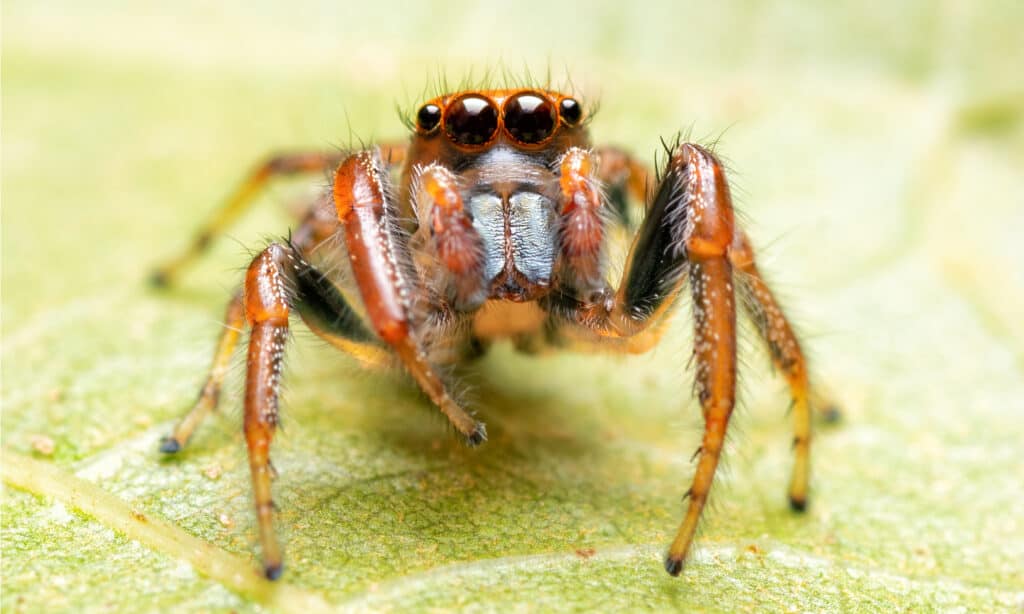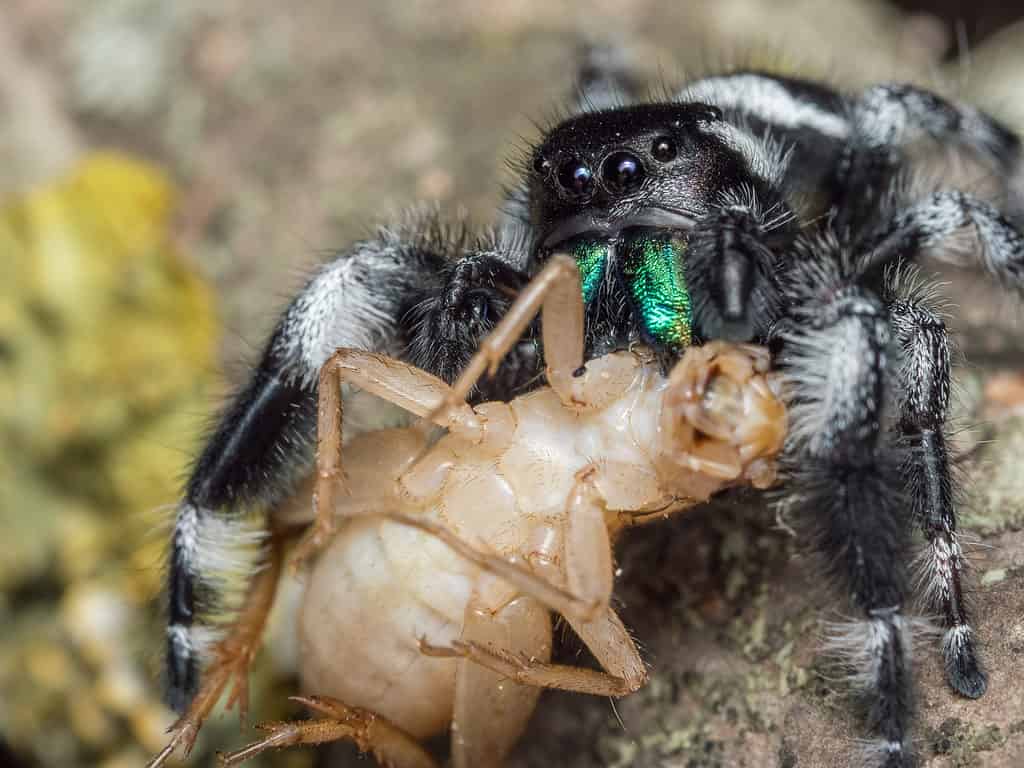Spiders are arachnids that create a sense of fear in many people. After all, they are sneaky, fast, and skitter around on eight legs, and some of them even have venom that can harm humans. Looking into their numerous eyes, one may think they are malevolent creatures. Do spiders have emotions, though?
Learn what it takes animals to feel emotions and whether spiders can feel a sense of happiness.
What Are Emotions?

While some animals can experience emotions, not all of them do.
©Jaromir Chalabala/Shutterstock.com
Before looking at spiders’ emotions or lack of emotions, it’s necessary to understand what they are and where they come from.
The American Psychological Association defines emotions as “conscious mental reactions (such as anger or fear) subjectively experienced as strong feelings usually directed toward a specific object.” Furthermore, emotions induce a behavioral or physiological change in the body.
While different experiences can create emotional reactions, emotions themselves are processed in the brain. At least, emotions as humans understand them are processed in the brain.
So, a brain and a complex central nervous system are required to generate and feel emotions. Humans are not the only creatures that experience emotions. After all, dogs express surprise, happiness, and sadness, and their bodies undergo chemical changes during various emotional states.
So, a human-like level of consciousness is not necessary to feel emotions. That doesn’t necessarily mean that any creature can feel emotions, though. Some of them just don’t have a developed central nervous system to allow them to process emotions and experience the resulting feelings.
What Is Happiness?
Happiness is not a monolithic emotion. Rather, happiness is an emotional state that comes from satisfaction, joy, or contentment. While humans have a unique understanding of happiness, we’re not the only ones who feel it. Several animals, especially mammals, feel happiness and display physiological responses to this emotional state.
In humans, happiness requires activity from several parts of the brain while also utilizing neurotransmitters like dopamine, serotonin, endorphin, and norepinephrine. Happiness as defined by humans requires a neurological process similar to humans.
Higher mammals, like elephants, feel and express feelings of happiness and joy. Their complex cognition is a product of their developed brains and nervous systems. Without the systems in place to feel happiness, a creature cannot experience it.
While humans have discovered that many types of animals feel emotions, less complex creatures probably do not feel them.
Can Spiders Feel Emotions?

This Sylvana jumping spider may look curious and intrigued, but it’s probably not feeling fear.
©Sari ONeal/Shutterstock.com
No, spiders cannot feel emotions analogous to those felt by humans. At last, science hasn’t confirmed that spiders feel what humans would recognize as emotions. Spiders lack the cognitive complexity and biological structures required to feel and demonstrate emotional states. The average spider has a very small brain and a basic nervous system compared to humans or other higher mammals.
Humans have undertaken some studies to learn how spiders deal with the appearance of predators. One study examined how jumping spiders’ responded to spiders encroaching on them. Jumping spiders have a high level of visual acuity compared to some others, so they had a better chance of recognizing humans.
The study used 3D-printed spider models and forced the jumping spiders to encounter them. The spiders would freeze and engage in risk assessment behaviors when presented with a 3D-printed version of a predator, even other spiders. After the spiders considered the other creatures, they would retreat. However, they did not engage in that sort of behavior with non-predator objects.
Now, some people have taken this study to mean that spiders feel fear, an emotion. However, stopping and assessing a potential threat and then running away is not the same as fear. It’s a reaction wired into their nervous system.
It’s not responsible to label a spider backing away from a large predator as demonstrating fear. After all, a robot vacuum has cliff sensors to make it back away from staircases and other cliffs in one’s home. An automatic response isn’t necessarily an emotional one. So, as far as humans can tell, spiders cannot feel emotions.
Can Spiders Feel Happiness?

The spider may feel satisfaction from earning a meal, but that isn’t the same as being happy.
©iStock.com/Macrolife.it
No, spiders cannot feel happiness as humans feel it. Happiness requires the same complex biological structures as other emotions, and spiders lack those. Some studies have found that insects feel a certain level of contentedness or satisfaction when they find food.
In one study, a biologist trained bumblebees to fly to green or blue flowers. The green flower contained water and the blue one had a 30 percent sugar solution. Over time, the bees began to realize that the blue flower had more to offer.
The study then added green-blue flowers, and half of the bees were provided with a 60 percent sugar solution before the test. Those bees flew to the ambiguous flowers even faster to the flowers, ultimately demonstrating an optimism bias in the bees.
The study continued, and the scientists used a dopamine receptor blocker on the bees, effectively removing their optimism bias. The study demonstrated the physiological changes that happen when a creature has a positive interaction. However, that does not prove that the bees have feelings or a subjective experience of emotions.
At best, the study showed that bees might have the building blocks of emotions.
So, do spiders feel emotions? No, at least they don’t feel them in the same way as humans. They may have the building blocks of emotions present. Does that mean they are unthinking and unfeeling creatures? Well, science continues to get a better idea about these creatures’ experiences. While they may not have the full emotional range of feelings of humans, they may have rudimentary mechanisms to allow them to experience something akin to emotions.
The photo featured at the top of this post is © iStock.com/Macrolife.it
Thank you for reading! Have some feedback for us? Contact the AZ Animals editorial team.






